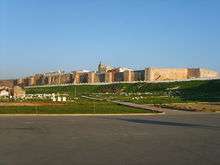Ahmed el Inglizi

Ahmed el Inglizi ("Ahmed the English"), also Ahmed El Alj or Ahmed Laalaj ("Ahmed the Renegade"), was an English renegade architect and engineer who worked for the Sultan of Morocco Mohammed ben Abdallah in the 18th century. As described by his surname "El Alj", Ahmed el Inglizi was a "renegade", i.e. he had abandoned Christianity for Islam.[1] He seems to have joined with the pirates known as the Salé Rovers.[2]
He is known for building parts of Essaouira (particularly the harbour entrance), after Frenchman Théodore Cornut had designed and built the city itself, particularly the Kasbah area, corresponding to the Royal quarters and the buildings for Christian merchants and diplomats.[3]
Ahmed el Inglizi is also known to have worked for the King in Rabat, where he restored the Kasbah Mosque, an old building dating to around 1150.[1] He was also responsible for several of the fortifications built in Rabat.[4]
See also
Notes
- 1 2 Maverick Guide to Morocco by Susan Searight p.171
- ↑ "Ahmed el Inglizi- one of the number of European pirates who joined up with the Salle Rovers" in The real guide, Morocco by Mark Ellingham, Shaun McVeigh Prentice Hall, p.189 ISBN 978-0-13-783697-0.
- ↑ Of Essaouira: "He employed European architects to design it, one a Frenchman said to be his prisoner, and the other an Englishman, converted to Islam and known as Ahmed el-Inglizi— otherwise Ahmed the Englishman." in Morocco Dorothy Hales Gary, Baron Patrick Balfour Kinross, Viking Press, 1971 p. 35.
- ↑ "El Inglizi was responsible, too, for several of the forts built below and around the plateforme" in The real guide, Morocco by Mark Ellingham, Shaun McVeigh Prentice Hall, p.189 ISBN 978-0-13-783697-0.
